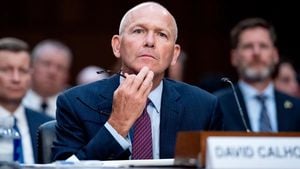After intense negotiations stretched over two weeks, the COP29 climate conference, hosted by Azerbaijan, concluded with the announcement of what many call the "imperfect" finance deal meant to assist developing countries combat climate change. Although there was applause when the gavel finally fell at around 3 am on Sunday, the relief was swiftly overshadowed by discontent from various nations and climate activists.
With the aim of addressing financing issues for developing nations, COP29 initially aimed for wealthier nations to commit about $1 trillion annually. Yet, the finalized deal only promised $300 billion each year by 2035. The agreement not only fell short of the aspirations many had but also left significant unanswered questions about accountability and contribution.
The conference saw nearly 200 countries locked in heated debates and negotiations, which were so convoluted at times they required delegates to retreat to smaller rooms to hash out disagreements privately. This pattern led to walkouts from certain delegations feeling their voices were being sidelined. Particularly notable was the protest by representatives from numerous climate-vulnerable nations who expressed their dissatisfaction with the proposed aid.
What the Agreement Entails
The text established requirements for developed countries to channel $300 billion each year to aid developing countries by the year 2035. Though this appears to be progress from the previous target of $100 billion outlined during the Paris Agreement back in 2015, critics argue it lacks the rigor necessary to make any substantial impact. The original aim of raising $1.3 trillion annually has become somewhat of a vague invitation rather than a committed target. The anticipated roadmap, known as the “Baku to Belém Road Map,” is expected to be elaborated on before next year’s COP30 meeting, which is set to take place in Brazil.
One of the most contentious issues remains the identification of who exactly is responsible for providing this financing. While the document acknowledges the need for contributions from governments, private financing, and financial institutions like the World Bank, it remains intentionally vague on specifics. The sheer lack of clarity had participants puzzled. China's role is particularly intriguing. Classified as a developing nation under existing climate agreements, it wasn't mandated to contribute to climate financing. Nonetheless, it plans to offer voluntary contributions, signaling its willingness to step up, albeit without obligation.
Reactions to the deal were polarized. Advocates argued it was still significant progress, emphasizing the need for nations to work concertedly amid challenging geopolitical conditions. Rob Moore, director of the climate change think tank E3G, highlighted, “Setting the goal at this COP was necessary, showing there are many nations striving to collaborate, even under tough circumstances.” Conversely, Mohamed Adow, from Power Shift Africa, called the final figure “a disaster for the part of the world on the road to development, a betrayal of the people and the planet.”
More Criticisms of the COP29 Deal
COP29 president Mukhtar Babayev acknowledged the deal's insufficiencies, pointing fingers at wealthier nations for not contributing as much as needed. He lamented the fact high-emitting historical countries were “immovable” during negotiations, complicately nuancing the discussions and delaying agreements.
Despite the negatives, Babayev was willing to tout the agreement as "a major step forward" since it nonetheless enhances the previous pledge articulated during COP15. Criticism also rolled forth from representatives of least developed countries who lambasted the deal for what they perceived as meager offerings. The African Group of Negotiators described the deal as being “too little, too late,” illustrating the frustration shared by many developing countries aiming for substantial support to drive their green energy transitions.
The potential of achieving $1.3 trillion was set forth as fundamental, yet the document did not provide clarity on how this ambitious number would be reached. The agreement allows for voluntary support from developing nations not previously involved, including China, but specifics on how this might pan out remain vague.
Carbon Market Developments
Another notable development was the establishment of rules for the much-discussed carbon trading market, but challenges remain. These regulations are meant to create standards for carbon credit trading, fostering conditions for technology transfers and emissions reductions through incentives. While many view this as progress, skeptics are quick to point out the lack of concrete mechanisms to enforce or gauge the quality of carbon credits.
Future negotiations will seek to resolve outstanding details on trading frameworks, including creating registries and ensuring emission reductions aren’t double-counted. The demand for higher standards for carbon credits remains, as critics still have many questions about what constitutes quality credits.
Looking Ahead to COP30
The next climate summit, COP30, is scheduled to occur from November 10-21, 2025, in Belém, Brazil, which is centrally located near the Amazon Rainforest. The focus is anticipated to shift toward addressing biodiversity loss, and there are expectations to revisit fossil fuel use and explore options for potential taxes on coal, oil, and natural gas. Notably, it is the third consecutive year these discussions will be held amid growing pressures for countries to phase out fossil fuels, especially against the growing backdrop of climate-related catastrophes.
Attendees will be examining what progress can be made on the $300 billion climate finance target as well. Reports are expected before COP30 on scaling up climate finance, with many already expressing their dissatisfaction with the UN climate talks. Indeed, senior climate leaders voiced frustration such summits were no longer fit for purpose. With this backdrop, whether COP30 can deliver effective commitments remains to be seen, particularly as the disillusioned factions of developing nations continue to call for more decisive actions against climate change and increased accountability from richer nations.



